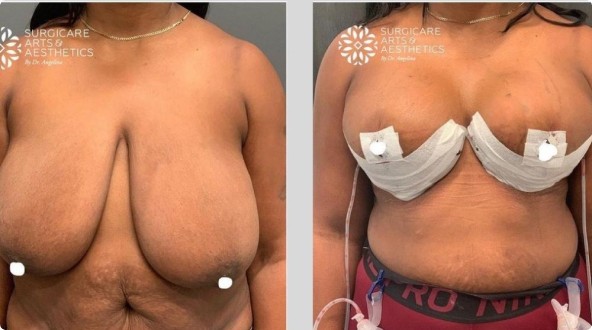Today we are going to talk about what you need to know about breast reduction surgery aftercare. If you or a loved one is considering undergoing a breast reduction, knowing what to expect and how to properly care for yourself during recovery can alleviate anxiety and ensure you get the results you want.
Larger Is Not Always Better
The burden of breasts that are disproportionately big, especially for women with petite frames, cannot be emphasized enough. These burdens manifest in various ways, from the practical to the emotional. Finding clothing that looks nice and fits properly can be a huge ordeal, and the battle with back pain, as well as the incessant discomfort and groove lines from straps that dig into your shoulders, becomes a part of life. Engaging in sports or physical activities becomes challenging, if not impossible when you are plagued with disproportionate breast size.
The heaviness of large breasts extends way beyond the physical realm and can create a heavy emotional toll, especially for those who develop large breasts at a young age when their peers have yet to experience such changes. In these cases, young women find themselves singled out, talked about, and subjected to hurtful gossip solely because of a physical trait over which they have no control. The emotional struggle is profound and can significantly negatively impact self-esteem and body image.
It is no wonder, then, that many women with overly large breasts ultimately seek relief through breast reduction surgery. The desire for such a procedure is not merely about cosmetic preferences; it is a heartfelt longing for physical comfort, emotional well-being, and the opportunity to lead a life free from the burdens that excessively large breasts can impose. The good news is that cosmetic surgery is available to reduce excessively large breasts and, depending on the circumstances may be covered by medical insurance.
Breast reduction surgery, medically known as reduction mammoplasty, reduces the size and reshapes the breasts to be more proportionate to the rest of the body. While this operation can be life-changing for many women, it’s essential to understand what care after breast reduction surgery is needed to ensure a safe and successful recovery.
Post-Breast Reduction Care
Days 1-7
This surgery is most often done under general anesthesia as an outpatient procedure. You’ll spend a few hours in a recovery room after surgery before going home.
As you gently wake up, you will be monitored by medical workers to help you with any common anesthesia-induced side effects, such as nausea or vomiting. Your breasts will most likely be covered with bandages, tape, and a special supportive bra that will assist in helping you heal faster and lessen the discomfort related to swelling and bruising. Some patients may require special drains due to the extent of the procedure.

To improve circulation and decrease blood clot risks, a healthcare worker will help you take short walks as soon as you are able to steadily stand. These types of walks should continue through the duration of your breast reduction post-op care.
Since you can’t drive, you’ll need a friend or family member to drive you home when your surgeon clears you to leave, and you may want them to stay with you for the first day or two. You will be provided with a list of instructions when you are released, providing details of your breast reduction surgery aftercare. This will include how best to maintain your wounds, drains, and self-care in the weeks ahead to ensure optimal recovery.
Discomfort and swelling are common during this stage; however, most patients report that they did not experience much pain after reduction surgery and were able to alleviate it with non-prescription medications. You may be given prescriptions for antibiotics and painkillers if necessary.
Days 8-14
In the initial weeks of your care after breast reduction surgery, your focus should be on self-care. Prioritize rest, maintain a nourishing diet, stay well-hydrated, and steer clear of demanding activities or lifting heavy objects to ensure a healthy healing process.
Some of your incision lines will be discreetly concealed; however, a degree of scarring is inevitable. Your surgeon can provide you with suggestions regarding topical creams and gels that can be used to alleviate some of their visibility. Normally, you will begin using these treatments after the wounds have healed completely.
You may still be experiencing ongoing fatigue, so grant yourself the rest you need when you feel tired; don’t try to rush back into your normal schedule. Your body needs time to recover from the anesthesia and is working hard to repair itself after the surgery.
Expect to contend with the typical post-surgery side effects of swelling that can persist for several weeks or visible bruising, but don’t worry as these will gradually subside. Some women experience temporary numbness or reduced sensation in their nipples or certain breast areas.
Days 25-30
It’s crucial to handle your breasts with care for a minimum of 4-6 weeks to ensure thorough healing. Remember, you most likely have sutures both inside and on the outside. It is normal to encounter some itching where the incisions were placed, and while annoying, it is a good sign indicating the wounds are healing.
Comfy clothing that is loose-fitting and soft is the best option during your post-breast reduction care. You should be able to introduce light activities as long as they do not cause pressure or strain on your wounds, but until your surgeon gives you the all-clear, you should not do any workouts or participate in activities that require strenuous movements.
Days 31 and beyond
As you reach around five weeks of care after breast reduction surgery, you should start feeling comfortable and more like yourself. You should notice that you have a higher energy level, do not tire as easily, and have regained your range of motion. Any self-dissolving stitches you may have had ought to have vanished entirely by this time.
Most likely, you will get the go-ahead to resume your fitness regimen, take leisurely baths, and sleep on your side or stomach, if you prefer. Also, after about six weeks, you will be able to see and admire how your breasts have changed, and you can even purchase and wear a chic new underwire bra!
Contact Board-Certified Surgeons at IBI Plastic Surgery & Med Spa
Your breast reduction aftercare plan is critical if you want great results and nice-looking breasts after your procedure. This makes it more important that you diligently stick to the guidelines for walking and avoid engaging in activities that could inhibit your recovery. Do not be afraid to seek assistance from friends or family members if you need it.
For women who are bothered by the physical and psychological effects of their large breasts, reduction surgery can be a life-changing procedure. Choosing a skilled and qualified board-certified surgeon to perform your procedure and following their post-breast reduction care advice is critical to getting the best outcome.
If you are dealing with physical or emotional pain due to the size of your breasts, IBI Plastic Surgery & Med Spa can help! Breast reduction surgery may be a viable option for you to ease your suffering. Dr. Angelina Postoev is a triple board-certified cosmetic surgeon who is well-known for her surgical expertise and skilled artistry.
Schedule an assessment today to explore the possibility of undergoing breast reduction surgery and experience the incredible advantages of alleviated discomfort, enhanced body confidence, and an elevated quality of life!







